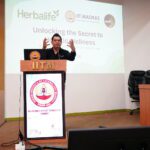India
healthysoch
New Delhi, February 25, 2024:
There are three primary types of burns: first-, second-, and third-degree burns. Each degree of burn is based on the severity of damage to the skin, with first-degree being the most minor and third-degree being the most severe. Further, while some burns can be treated at home, severe ones (second and third-degree) require immediate medical attention.
Most burns are treated by cleaning the area with soap and water, followed by dressings and topical creams. Nexobrid (concentrate of proteolytic enzymes enriched in bromelain) is a topically administered biological product that enzymatically removes nonviable burn tissue, or eschar, in patients with deep partial and full-thickness thermal burns within four hours of application without harming viable tissue. The cream has demonstrated a significant reduction in time to achieve complete eschar removal and a substantial decrease in wound area requiring surgical excision (surgical need) while demonstrating non-inferiority to SOC in the quality of scars (dead tissues).
Dr Sameek Bhattacharya, Head of Burn Unit, RML Hospital Delhi said, “In India, we have about 75 burn units and 26 skin banks to treat burn patients. There have been significant positive changes in the country regarding burn management. We have national programs for the prevention and control of burn injuries. There are different types of burns, including chemical, electrical, hot liquid, and burns from flame. However, all burns are the same as there is a layer of dead tissue on the skin that needs to be removed, so whatever the agent, it can be repaired through surgery or topical creams.
Burn treatment also depends on skin thickness; in my experience, younger people are more vulnerable to burns as they have thinner skin than the older population. A recent study says about 78,00,000 people get burnt annually, including minor burns. Furthermore, there are more than 10,00,000 hospitalizations yearly, and there is a need to reduce this number to improve patient outcomes.”
Prof . Lior Rosenberg, also Founder & CMO at MediWound Ltd , Israel says, “Nexobrid is a paradigm-shifting solution for treating burn victims as it only dissolves the dead tissue and does not impact the skin. It is an effective solution for treating burn victims, especially those who have suffered severe burns. In fact, this cream dissolves into the skin and does not impact the skin’s dermis. Since the dermis can heal spontaneously, it is essential to maintain it so that the patient’s recovery is faster.
Since the launch of Nexobrid in 2010, we have seen nearly 11000 patients benefit globally across 44 countries.
In India which has a huge population and a sizeable number of burn survivors, Nexobrid is an innovative treatment that can benefit large numbers of burn patients without them undergoing any intrusive surgeries says Rosenberg
Every burn victim is keen to reduce the pain and scarring caused by the burn. While burns are traumatic, this cream can be an effective solution as it will reduce the scars and improve patient outcomes. More importantly, since this cream reduces the need for surgery, it automatically reduces blood loss and pain associated with surgery. All in all, this cream will effectively reduce scaring as well.”
Bharat Serums and Vaccines (BSV), a biopharmaceutical company in India, inked an exclusive distribution agreement with MediWound (NASDAQ: MDWD) in December 2022 to introduce NexoBrid, a groundbreaking treatment for severe burns, in the Indian market.
healthysoch







